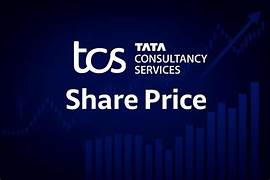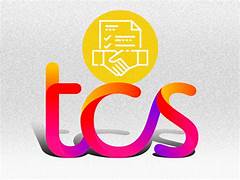Introduction to TCS and Its Market Legacy
Tata Consultancy Services (TCS), a flagship company of the Tata Group, is not just an IT services company — it’s a brand that represents India’s technological prowess on the global stage. Established in 1968, TCS has grown from a regional IT consultancy to one of the world’s largest IT services providers, with operations in over 46 countries and serving hundreds of Fortune 500 clients. Listed on the National Stock Exchange (NSE) and Bombay Stock Exchange (BSE), TCS made its debut in the stock market in August 2004, and since then, its share price journey has been nothing short of remarkable. From an initial public offering (IPO) price of ₹850 (adjusted for stock splits and bonuses), TCS stock has multiplied several times, making early investors extremely wealthy. As of July 2025, TCS commands a market capitalization of over ₹14 lakh crore, placing it among the top 3 most valuable companies in India. Its consistent dividend policy, strategic global expansions, client retention, and adoption of new technologies like Artificial Intelligence, Cloud Computing, Blockchain, and Cybersecurity have made it a favorite among long-term investors. The share price has often reflected the company’s resilience during economic downturns, such as the 2008 global financial crisis and the COVID-19 pandemic, highlighting its ability to adapt and thrive. TCS has steadily built a reputation not just for profit, but for trust and governance — a key factor that appeals to both retail and institutional investors alike.
Share Price Trends – Historical Performance and Key Drivers
Over the past two decades, TCS shares have provided outstanding returns, outperforming the broader Nifty 50 and Sensex indices. Historically, the TCS share price has shown a stable uptrend with periods of consolidation during global or sector-specific slowdowns. For example, during the 2008 global recession, the share took a temporary hit but bounced back stronger due to robust client demand and cost-effective delivery models. In 2020, the COVID-19 pandemic initially caused TCS shares to dip, but the quick adoption of remote working models, accelerated digital transformation demand, and renewed client contracts helped TCS bounce back sharply by late 2020. Since 2021, TCS has been on an aggressive digital pivot, enhancing its cloud services portfolio, investing in generative AI technologies, and forging strategic partnerships with companies like Google Cloud, AWS, and Microsoft Azure. These collaborations and acquisitions in analytics, cybersecurity, and automation have continued to fuel growth. In FY24–25, TCS stock witnessed a steady rise from around ₹3,200 to ₹4,300 per share, driven by strong quarterly earnings, new large-scale client acquisitions, and an overall positive sentiment in the Indian IT sector. Additionally, the rupee depreciation against the U.S. dollar — given that over 70% of TCS’s revenue comes from exports — often benefits its profit margins, which reflects positively in the share price. Analysts also note that the stock generally trades at a higher Price-to-Earnings (P/E) ratio compared to its peers, signaling investor confidence in its earnings visibility.
Financial Performance and Valuation Metrics
The backbone of TCS’s strong share price performance lies in its robust financials. For FY2025, TCS reported consolidated revenue of over ₹2.6 lakh crore, with a net profit exceeding ₹52,000 crore — a nearly 15% YoY increase. Its operating margin remains healthy, hovering around 24%, among the best in the industry. This consistency in performance showcases the company’s ability to manage costs effectively, scale its delivery centers globally, and maintain pricing power in client negotiations. The company’s Return on Equity (ROE) and Return on Capital Employed (ROCE) consistently stay above 30%, making it a highly efficient business. Furthermore, TCS maintains a virtually debt-free balance sheet with significant cash reserves, allowing it to invest in R&D, strategic acquisitions, and share buybacks. One of the key aspects that attract investors is TCS’s shareholder-friendly policies — including regular dividends, bonuses, and buybacks. In fact, TCS has distributed thousands of crores in dividends over the last few years, reinforcing its position as a blue-chip stock. On valuation metrics, TCS often trades at a premium — with a P/E ratio around 30–32x — but investors justify this premium due to the company’s visibility into future earnings, vast global presence, and consistent growth. Compared to competitors like Infosys, Wipro, and HCLTech, TCS boasts a stronger client base, higher employee productivity, and a more diversified portfolio, which adds to its valuation.
Future Outlook – Opportunities and Challenges for the Share Price
Looking forward, TCS’s share price is expected to benefit from a variety of structural growth drivers. The global shift toward digitization, AI-led transformation, cloud migration, and data security has created immense demand for IT services, especially from BFSI (Banking, Financial Services, and Insurance), healthcare, manufacturing, and retail sectors — areas where TCS has deep expertise. With the Indian government also pushing for Digital India initiatives and global companies looking to optimize costs by outsourcing to India, TCS stands at a unique advantage. Moreover, its emphasis on upskilling employees in AI, machine learning, and cybersecurity prepares it for future challenges. However, there are potential headwinds to watch for — including global economic uncertainties, inflationary pressures in the U.S. and Europe (its biggest markets), visa restrictions, rising employee costs, and competition from nimble startups and automation tools. Yet, with a robust order book, innovation-led leadership, and Tata Group’s legacy behind it, TCS is well-positioned to navigate these challenges. Market analysts from firms like Goldman Sachs and Morgan Stanley continue to give TCS a “Buy” or “Overweight” rating, projecting a target price between ₹4,500 to ₹5,200 by end of FY2026, depending on macroeconomic conditions. Retail investors looking for long-term compounding returns continue to show interest in accumulating TCS shares during market corrections.
Conclusion – Is TCS a Good Investment Right Now?
TCS has emerged as a symbol of India’s IT excellence and a trustworthy investment avenue for conservative and aggressive investors alike. Its consistent performance, innovation-led strategy, leadership stability, and shareholder-first approach make it a dependable stock in a volatile market. Whether you’re a new investor looking for a blue-chip company or a seasoned portfolio manager seeking stability with returns, TCS deserves a place on the watchlist. The stock is not only resilient during market downturns but also offers opportunities for capital appreciation and regular income through dividends. While it may not offer the explosive short-term returns of smaller IT firms or tech startups, its steady, predictable growth makes it ideal for wealth creation over the long term. As of July 2025, with the IT sector expected to grow at a CAGR of 8–10% globally, and with India continuing to strengthen its position as the outsourcing hub of the world, TCS remains poised for continued upward momentum. In conclusion, TCS is more than just a stock — it is a benchmark of value, discipline, innovation, and long-term potential for anyone seeking to invest in India’s IT success story.
Institutional Interest and Global Investor Sentiment in TCS
One of the key indicators of a company’s stability and growth potential in the stock market is the level of institutional investor interest — and in the case of Tata Consultancy Services (TCS), this interest is substantial. Foreign Institutional Investors (FIIs) and Domestic Institutional Investors (DIIs) have consistently held large stakes in TCS due to its strong fundamentals, robust return on investment, and transparent corporate governance practices. For instance, mutual funds, pension funds, sovereign wealth funds, and international asset managers view TCS as a defensive stock — one that delivers consistent returns even in volatile market environments. In the quarter ending June 2025, institutional investors held over 55% of TCS shares, signaling strong long-term conviction. This level of participation adds stability to the stock price and also contributes to its inclusion in several global indices like the MSCI Emerging Markets Index and the FTSE All-World Index. These inclusions bring passive investment inflows into the stock, ensuring consistent demand.
Moreover, TCS’s ADR (American Depositary Receipt) listings and presence in global capital markets allow U.S. and European investors to participate in its growth story without dealing with the Indian market directly. This global accessibility has made TCS one of the most widely tracked Indian stocks globally. Another reason why global investors are bullish on TCS is its minimal exposure to risky debt, strong ESG (Environmental, Social, and Governance) ratings, and Tata Group’s legacy of ethical business practices. Even during global geopolitical instability, recession fears in the West, or technology sector corrections in NASDAQ, TCS shares have demonstrated remarkable resilience. Its broad client portfolio across various geographies and industries acts as a hedge against region-specific risks. Recently, global research firms like JP Morgan, Nomura, and Barclays have reiterated their bullish stance on TCS, citing its AI-driven transformation roadmap and strategic acquisitions as key levers of growth. All these factors cumulatively make TCS a magnet for smart money — where long-term investors are not just chasing returns but also safety, governance, and innovation.
Final Verdict – Should Retail Investors Consider TCS in 2025?
For retail investors navigating the increasingly complex Indian stock market, Tata Consultancy Services presents a rare combination of growth, stability, and trust. Unlike speculative small-cap stocks or volatile tech IPOs, TCS offers a well-documented track record of wealth creation over decades. If you had invested ₹1 lakh in TCS shares at the time of its IPO in 2004 and simply held on, that investment would have grown to over ₹25–30 lakhs today, factoring in price appreciation, dividends, and bonuses. Even in the last five years, TCS has delivered a steady CAGR of around 15–20%, with limited downside volatility. For SIP (Systematic Investment Plan) investors, TCS is a strong candidate, especially when looking to balance risk and return over a long horizon like 5–10 years. Its leadership in cutting-edge technologies such as cloud migration, AI services, digital workplace solutions, and data security means that it is not just riding trends but actively shaping them.
Moreover, TCS regularly announces stock buybacks, interim and final dividends, and maintains a high payout ratio — making it suitable for income-focused investors too. The company’s culture of employee stability, low attrition compared to peers, and commitment to innovation ensures it stays competitive even in disruptive times. Looking at FY2026 and beyond, TCS’s plans to invest in AI-based automation, sustainability-focused IT frameworks, and expanded presence in Tier-2 Indian cities could further boost operational margins and customer outreach. For young investors starting out in equity investing or middle-aged individuals looking for secure portfolio components for retirement planning, TCS ticks nearly every box. It’s also a tax-efficient stock due to capital gain advantages on long-term holdings in India. While it’s true that no stock is entirely risk-free, TCS offers one of the best examples of a low-risk, high-trust, steady-return investment. In a world where tech companies rise and fall with each quarter, TCS stands tall — not as a speculative bet, but as a cornerstone of any prudent investor’s portfolio.
ESG Commitment and Its Impact on TCS Share Price
In today’s evolving financial landscape, Environmental, Social, and Governance (ESG) factors have become central to investor decision-making processes — especially for institutional investors, sovereign funds, and high-net-worth individuals. TCS has recognized this shift early and integrated ESG frameworks deeply into its corporate strategy, something that directly influences its share price performance in the modern equity markets. From reducing carbon emissions across its global delivery centers to deploying green data centers powered by renewable energy, TCS has positioned itself as a forward-thinking, environmentally conscious corporation. The company has pledged to achieve Net Zero emissions by 2030, and it regularly publishes detailed sustainability reports audited by third-party agencies to maintain transparency and accountability.
On the social front, TCS is involved in numerous community upliftment programs across India and abroad. Through its flagship TCS iON Digital Learning Hub, the company is empowering millions of students in rural India with free tech skills and certifications. During the COVID-19 pandemic, TCS was among the top contributors to healthcare relief efforts, demonstrating its commitment to social impact. From gender diversity initiatives to local hiring in foreign markets like the U.S., UK, and Europe, TCS is steadily moving toward becoming a global model of inclusive growth. This level of engagement not only builds goodwill but also reduces reputational risk — a factor that institutional investors now consider more seriously than ever before.
In terms of governance, TCS stands tall among its peers. The board is composed of highly reputed independent directors, including global business leaders and former regulators. Audit transparency, shareholder engagement, whistleblower protection mechanisms, and conflict-of-interest disclosures are rigorously enforced within the company’s structure. These governance standards ensure that the interests of minority shareholders are protected, and decision-making remains free from promoter dominance or executive mismanagement. As a result, TCS consistently scores high on governance metrics published by agencies like MSCI ESG Ratings, Sustainalytics, and CRISIL. For FIIs and global ETFs that are mandated to invest only in companies with high ESG ratings, TCS becomes an automatic choice — ensuring long-term capital inflow.
Now, how does all of this tie back to the share price? In recent years, ESG-aligned companies have outperformed their counterparts globally because they are better positioned to handle regulatory changes, consumer expectations, and climate-related disruptions. TCS’s ESG strategy acts as a long-term moat, attracting global capital, improving brand perception, and creating operating efficiencies through sustainable practices — all of which reflect in shareholder returns. In fact, several ESG-focused mutual funds and index ETFs have increased their weightage in TCS in the past 3 years, directly boosting demand for the stock in secondary markets. ESG compliance also reduces long-term litigation risks, regulatory fines, and reputational damage — indirectly supporting the company’s valuation multiples.
In conclusion, TCS’s approach to ESG is not just a compliance exercise, but a strategic imperative that enhances its market standing and investor appeal. As ESG investing becomes more mainstream — especially among Gen Z and millennial investors — TCS’s alignment with these principles gives it a competitive advantage. This is why analysts now include ESG scores in their valuation models, and in the case of TCS, it acts as a premium trigger — often justifying its higher P/E multiple over peers. In a world increasingly driven by ethical capitalism and responsible investing, TCS is not just building code and delivering software — it’s shaping a sustainable future. And that future, as seen through its rising share price, looks increasingly green and profitable.


